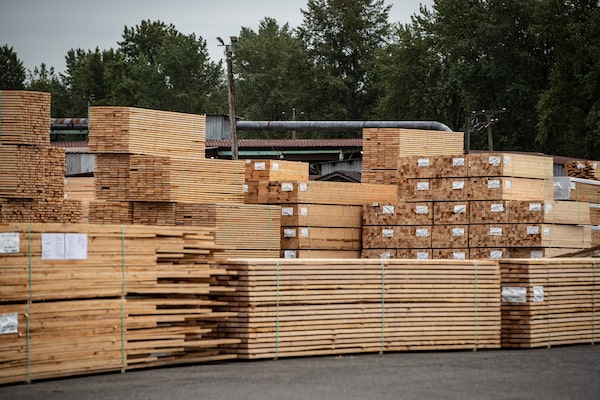
Stacks of lumber are seen at a sawmill in Surrey, B.C., on May 30, 2021. The U.S. Lumber Coalition says punitive tariffs against lumber producers in Canada since 2017 are the reason production has ramped up in the United States.DARRYL DYCK/The Canadian Press
The U.S. South is becoming an increasingly important lumber supplier in North America, bolstered by Canadian companies gaining easy access to forests and the side benefit of escaping U.S. tariffs on softwood.
The U.S. Lumber Coalition says punitive tariffs against lumber producers in Canada since 2017 are the reason production has ramped up in the United States. But industry experts in Canada say higher output south of the border has much more to do with the availability of timber supplies than duty rates against Canadian producers.
Forestry consultant David Elstone, managing director of Spar Tree Group Inc., said the main driver of investments is gaining access to timber in forests, also known as the “wood fibre basket.”
Industry experts forecast that production capacity in the U.S. South, where acquiring logs costs much less than in B.C., will continue to rise from privately owned plantations of southern yellow pine over the next three to four years.
“The prime motivation is the wood fibre basket,” Mr. Elstone said in an interview on Tuesday, one day after the U.S. Department of Commerce said it would maintain tariffs against Canadian producers shipping lumber south of the border, although at lower duty rates that will take effect this fall.
“Canadian producers are getting more U.S. capacity because that’s the best place to invest, given the fibre supply and relatively lower costs,” he said. “They’re not going to the United States just to avoid the duties.”
U.S. to reduce levies on most Canadian softwood producers
Under its preliminary determination, the Commerce Department said on Monday that it plans to levy tariffs totalling 11.64 per cent against most Canadian lumber producers exporting to the United States starting in the fall – down from the current 17.91 per cent.
The reduced tariffs would consist of 6.88 per cent in countervailing duties for what the U.S. calls Canadian subsidies, and 4.76 per cent in anti-dumping duties.
The 2006 Canada-U.S. softwood agreement expired in October, 2015, with no replacement. In the latest round of the trade dispute dating back to 1982, Canadian producers have been paying U.S. lumber duties since April, 2017.
West Fraser Timber Co. Ltd., Canfor Corp. and Interfor Corp. are among the B.C.-based producers that announced plans last year to add to their portfolio of U.S. sawmills, mostly through investments in the U.S. South.
Vancouver-based West Fraser said it would spend US$150-million to expand five of its sawmills in the U.S. South and agreed to buy a Texas mill for US$300-million. Vancouver-based Canfor disclosed plans to build a new sawmill in Louisiana for US$160-million, while Interfor Corp. of Burnaby, B.C., paid US$375-million to acquire a total of four sawmills – in Mississippi, Alabama and Louisiana in the U.S. South, and Oregon in the Pacific Northwest.
Crown timber accounts for 95 per cent of British Columbia’s forested lands, and only 5 per cent is private. In Alabama, nearly 95 per cent is private.
Wood from Canada recently accounted for more than one-quarter of U.S. lumber demand, while producers in the United States provided about two-thirds of their domestic market, primarily for construction framing.
Hiking U.S. duties on Canadian softwood could damage our relationship with the U.S.
The U.S. Lumber Coalition estimates that in the past five years, production of American-made lumber has climbed by an average of 3.5 billion board feet annually.
In sharp contrast to the hectic activity in the lumber sector in the U.S. South, there is uncertainty over the availability of timber in British Columbia during a period of high lumber prices for Western spruce, pine and fir.
The B.C. NDP pledged during the provincial election campaign in 2020 to recognize and protect the unique attributes of old-growth forests. After being re-elected, Premier John Horgan’s government gradually took steps toward reforming forestry policies amid escalating tensions between the forestry industry and environmental groups.
“Everything is just stacked negatively against the B.C. lumber industry going forward, and production can’t be increased,” wood business consultant Russ Taylor said.
Mr. Taylor said other Canadian-based companies with U.S. sawmills include Montreal-based Resolute Forest Products Inc., Saint John-based J.D. Irving Ltd., Tolko Industries Ltd. of Vernon, B.C., and Teal-Jones Group of Surrey, B.C.
Anti-logging protesters at Fairy Creek on Vancouver Island have been trying to stop Teal-Jones from harvesting old-growth trees, with more than 1,100 people arrested last year during demonstrations. In December, Teal-Jones said it plans to invest more than US$100-million to build a sawmill in Louisiana.
The trend of B.C.-based producers investing outside the province isn’t confined to the United States. In November, Interfor said it is acquiring Eacom Timber Corp., which focuses on lumber production in Ontario and Quebec. In December, Canfor announced that it is buying Millar Western Forest Products Ltd.’s lumber operations in Alberta.
RBC Dominion Securities Inc. analyst Paul Quinn said B.C.-based lumber producers think strategically when studying whether to invest in their home province or other jurisdictions. He views the U.S. South as the most attractive region for growth, followed by Alberta, the U.S. Pacific Northwest and Central Canada.
“For producers with operations in British Columbia, the urgency to diversify production outside the high-risk province will be greater,” Mr. Quinn said in a recent research note.
Your time is valuable. Have the Top Business Headlines newsletter conveniently delivered to your inbox in the morning or evening. Sign up today.
 Brent Jang
Brent Jang